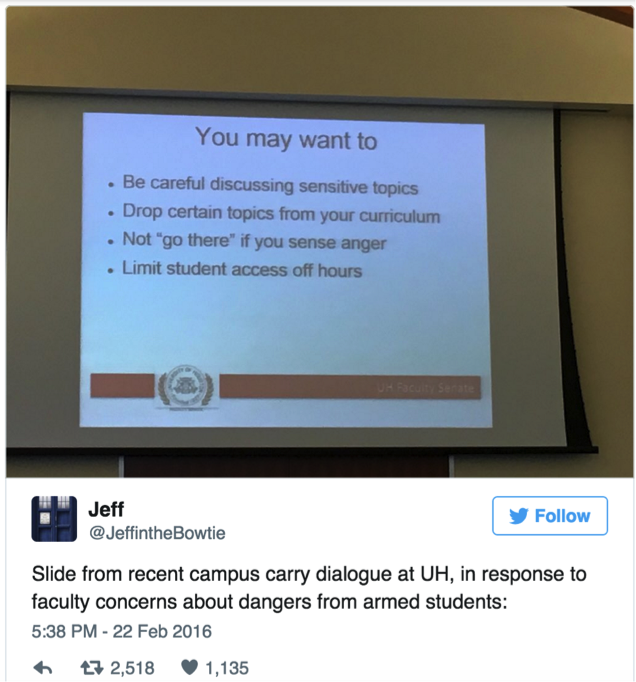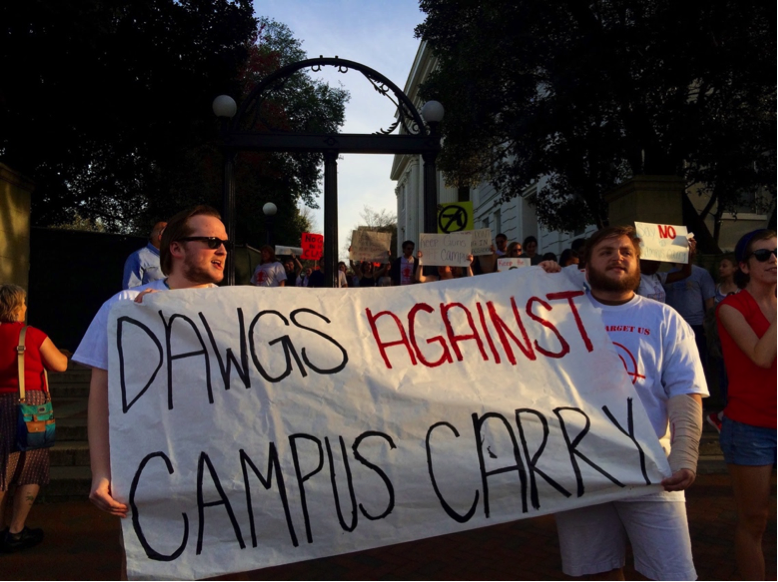When it comes to gun rights, the meaning of the word “safe” varies greatly depending on who you talk to. Gun control has been a huge topic of debate in recent years. Following Georgia’s passage of the 2014 “Guns Everywhere” bill, the most recent push from pro-gun supporters has been to extend the meaning of “everywhere” to include college campuses. Despite vastly differing opinions emerging since its passage, one thing is for certain: the Campus Carry bill is sparking some serious debate on Georgia’s campuses.
House Bill 859, also referred to as the Campus Carry bill, would legalize firearms on all public college campuses in Georgia. It has passed the House and Senate and now waits on the desk of Governor Nathan Deal to be signed into law.
In a nation that suffered through 23 shootings on college campuses in 2015, the words “firearms” and “college campus” do not tend to provoke positive reactions when used in a sentence together. It would seem that the last thing anyone would want at universities would be more guns. But let’s get the details of this bill straight before jumping to conclusions.
The Campus Carry bill limits the ability to carry guns on campus to individuals 21 or older with a weapons license. These guns can be carried anywhere on public college or university campuses except inside dormitories, fraternities and sorority houses, and at sporting events. These guns must be handguns and they must be concealed, which proponents claim make the bill safer because “concealed carry” permits require background checks and fingerprinting.
The details of the bill, it seems, are not very detailed at all. HB 859 is less than two pages long. Since its proposal in January, much debate has arisen over the consequences of enactment as well as aspects not addressed in the bill, including its lack of mental health and training provisions and failure to address a means of payment for enforcement.
Eight other U.S. states allow some form of “campus carry” law, while 23 states allow individual schools to decide. Proponents of the bill claim that it would make campuses safer, allowing students to protect themselves and others in case of emergency.
When voting on the bill, Representative Heath Clark argued, “People are being robbed at gunpoint in college buildings on college campuses. Guns are already there. What we’re voting on today is to allow law abiding citizens the opportunity to defend themselves on college campuses.”

More support for the bill swept in after recent armed robberies at Georgia State University’s library in downtown Atlanta. Though officials have added new security measures including increasing patrols and planning for fingerprint identification, some are convinced that students would be safer in such situations if they could pull out a gun of their own.
But many are wary of the consequences, fearing that adding more guns to the mix will only create a more dangerous situation for students and faculty. In an era of high anxiety amongst college-aged students, a common point of opposition is that we would only be asking for trouble by allowing more guns in an area heavily populated with stressed students who may not have reached full maturity.
While gun rights advocates are pushing for the allowance of guns “everywhere,” there still remain several places they are not allowed: at the State Capitol and other government buildings, for instance. Juone Brown, a tenured professor at Fort Valley State University, points out the hypocrisy of this exemption:
“The same legislature that would say it’s OK to have students come to class with guns is the same legislature that would not allow guns in the Capitol,” she says. “If it’s unsafe for the people considering the legislation, how is it safe for classrooms? It’s just a bad idea.”
Texas, the most recent state to sign a campus carry bill into law, gives Georgians a glimpse into what could soon become their future. Many faculty members oppose the bill, and universities are paying the price.
Amid fears of sparking students’ anger during classroom debate, professors at the University of Houston have been advised to consider dropping certain topics from curriculum, to be careful when discussing sensitive topics, and not to “go there” when they sense anger. They are cautioned to consider limiting office hours and meeting on an appointment-only basis, thus restricting students’ access to extra instruction due to a potentially hostile environment.

Gregory Fenvez, president of the University of Texas at Austin, spoke on this matter: “The presence of handguns at an institution of higher learning is contrary to our mission of education and research, which is based on inquiry, free speech, and debate.”
Essentially, professors are being instructed to limit debate and the free flow of ideas–the very thing that they were hired to encourage in the first place–in order to protect their own safety.
The forced adaptation of a law into universities where it is not supported proved too much for one well respected dean at the University of Texas at Austin. Fritz Steiner, the university’s longtime architecture dean, will leave his current position for another position at the University of Pennsylvania due to his concerns over the bill.
“I would have never applied for another job if not for campus carry,” he stated. “I felt that I was going to be responsible for managing a law I didn’t believe in.”
Though defenders of the bill cite the lack of “Wild West scenarios” in states with campus carry bills, numerous gun-related incidents have occurred, including several accidental shootings on campus. When it comes to the safety of students and faculty, waiting for a tragedy to occur is a much less than ideal solution.
In addition to safety concerns, enforcement of the bill would be expensive to carry out. Schools would face hefty costs associated with hiring more officers, providing additional training, and extending security at events. A police chief at the University of Central Florida claimed the state’s campus carry bill would cost his department $1.1 million in the first year.
In hopes of stopping Governor Deal from signing campus carry into law, University of Georgia students and faculty are fighting back. A petition to keep guns off UGA campus has reached nearly 8,000 signatures. Georgia Tech students have expressed similar concerns. UGA students, faculty and local Athenians marched and rallied in protest of the bill with signs and slogans such as “Keep The G Gun Free” and “Hey, hey, ho, ho, Campus Carry’s got to go.”

UGA honors student Cali Callaway has been very active in protest efforts. She cites the issue of domestic violence as a major point of concern when it comes to allowing guns on campus. Although proponents of the bill argue it will make women safer and reduce the number of rapes, Cali and others fear that more guns create a greater potential for domestic violence cases to end in homicide. Victims of sexual violence, many of them college students, are up to five times more likely to be killed when a gun is present.
“I understand that we have a Second Amendment right to bear arms, but owning a gun and carrying a loaded weapon into a college classroom cannot be equated,” she says. “I am proudly a lifelong Georgian, but I would not have chosen to stay in-state had this legislation been enacted when I was in high school.”
By enforcing campus carry, UGA and other schools could risk losing promising potential students like Cali as they consider campus safety and academic quality on their college search.
Georgia’s Board of Regents, which oversees all public colleges and universities in the state, has long opposed the allowance of guns on campus, including the 2014 attempt to allow campus carry as part of the Guns Everywhere bill. UGA President Jere Morehead also announced his opposition to campus carry, stating he supports University System of Georgia Chancellor Hank Huckaby’s testimony against it.
And it is not just those directly involved in universities who see more harm than good coming from guns on campus. A poll conducted by the Atlanta Journal-Constitution in 2014, during the time period that the Guns Everywhere bill was under debate, indicated that 78 percent of Georgians opposed allowing guns on the state’s college campuses.
The facts are difficult to ignore, even for “lifetime defender and staunch supporter of Second Amendment rights” Governor Deal. In response to growing concerns, he has called on the General Assembly to address issues concerning dually enrolled K-12 students on campus, daycare centers located on campus, and rules at disciplinary hearings and faculty offices. Opponents of the bill hope he will wait for significant changes to be made or let the bill die, but only time will tell.
In effect, HB 859 would force colleges to allow concealed carry of handguns to classrooms, dining halls, libraries and many other areas of campus, despite the staunch disapproval of these colleges’ Board of Regents, presidents, and many faculty and students. Perhaps state lawmakers should take into consideration the opinions of those closest to and most familiar with the situation at hand, instead of forcing allowance of concealed weapons on campuses while forbidding them in their own place of work.
